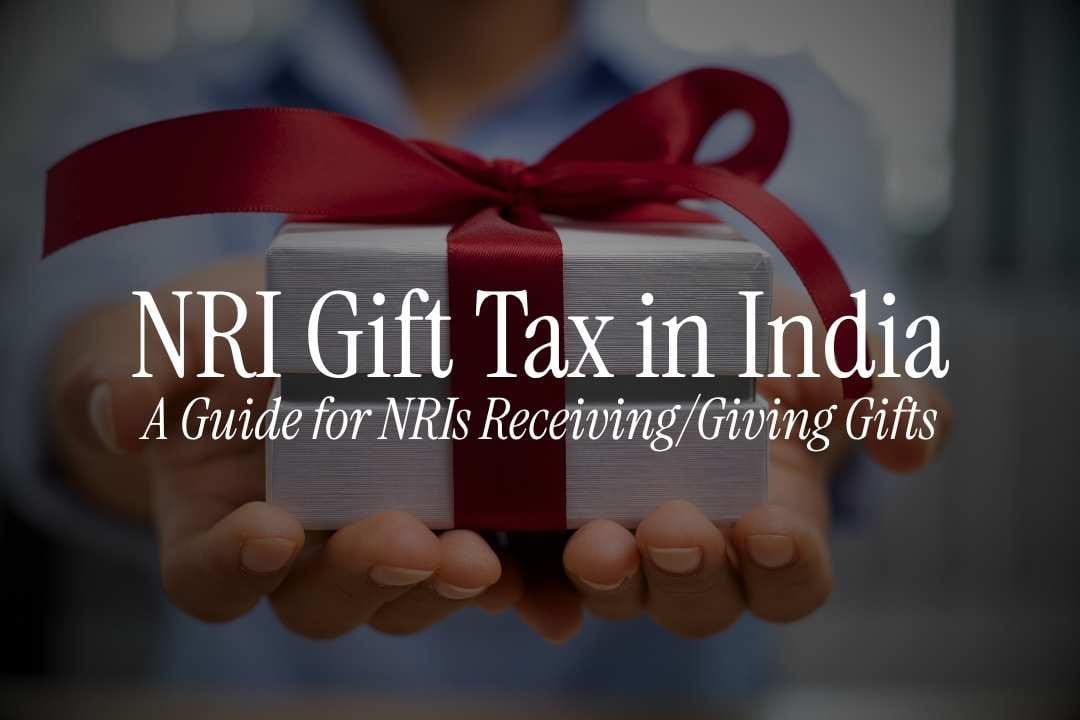NRI Gift Tax Rules: Complete Guide to Taxation & Exemptions in India

Many NRIs believe that gifts are always tax-free in India. That's only half true – and the half that's wrong can cost you dearly.
Last month, I received a call from Priya, an NRI in Toronto.
She'd sent ₹8 lakh to her parents for home renovation, thinking it was a simple gift. Two months later, her father received a notice from the Income Tax Department asking for documentation.
The confusion?
While gifts to parents are indeed tax-free, gifts exceeding certain limits from non-relatives can attract significant tax liability.
Here's what most NRIs don't realize: India abolished the Gift Tax Act in 1998, but gift taxation didn't disappear. It simply moved to the Income Tax Act under Section 56(2)(x).
Today, the rules are more nuanced, with specific exemptions and complex compliance requirements.
As a SEBI-registered investment advisor who has helped over 1,000 NRIs navigate Indian taxation, I've seen the same confusion repeatedly.
Whether you're sending money to family in India or receiving property as a gift, understanding these rules can save you from unexpected tax bills and compliance headaches.
This comprehensive guide breaks down everything you need to know about NRI gift tax in 2025 – from FEMA regulations to Income Tax exemptions, with real-world examples and actionable compliance tips.

You check your status using Belong's NRI Residential Status Calculator.
What is Gift Tax in India?
Under Indian law, a "gift" is any money, property, or valuable item received without paying adequate consideration (market value) for it. Think of it as receiving something for free or at a heavily discounted price.
The Income Tax Act treats gifts as "Income from Other Sources" and taxes them in the hands of the recipient – not the giver.
This is crucial for NRIs to understand: if you're receiving a gift in India, you may owe Indian taxes, even if you live abroad.
Types of Gifts Covered Under Tax Law
Monetary Gifts:
- Cash transfers
- Bank transfers
- Demand drafts or cheques
- Digital payments (UPI, online transfers)
Movable Property:
- Jewelry and precious metals
- Shares and securities
- Bonds and debentures
- Artwork, antiques, watches
- Vehicles (above certain value)
Immovable Property:
- Residential or commercial property
- Land (agricultural land gifting to NRIs is restricted)
- Property received at below market rates
👉 Tip: The tax applies to the fair market value of the gift, not what you paid for it. For property, this means the stamp duty value, which can be significantly different from the actual price paid.
When is Gift Tax Applicable for NRIs?
The taxation of gifts involving NRIs depends on the direction of the gift and the relationship between parties. Here's how different scenarios work:
Scenario 1: Resident Indian → NRI Gift
Tax Liability: Generally, the NRI recipient pays tax in India if conditions are met.
FEMA Limits: Under the Liberalised Remittance Scheme (LRS), resident Indians can gift up to USD 250,000 per financial year to NRIs.
Example: Rajesh (resident Indian) gifts ₹50 lakh to his NRI brother in Dubai. Since they're relatives, the gift is tax-free for the brother. However, Rajesh must ensure the transfer complies with LRS limits.
Scenario 2: NRI → Resident Indian Gift
Tax Liability: The resident Indian recipient pays tax based on gift value and relationship.
No FEMA Restrictions: NRIs can gift unlimited amounts to resident Indians, subject to Income Tax rules.
Example: Meera (NRI in USA) gifts ₹30 lakh to her friend in Mumbai. Since they're non-relatives and the amount exceeds ₹50,000, her friend must pay tax on the entire ₹30 lakh as income.
Scenario 3: NRI → NRI Gift
Tax Liability: Generally not taxable in India unless the recipient has Indian income sources.
FEMA Compliance: No restrictions under Indian law, but may be subject to local tax laws in the recipient's country.
The ₹50,000 Threshold Rule
This is where many NRIs get confused. Here's how it actually works:
- Gifts up to ₹50,000 annually: Tax-free from non-relatives
- Gifts above ₹50,000 annually:Entire amount becomes taxable, not just the excess
Critical Example:
If you receive ₹30,000 from Friend A and ₹25,000 from Friend B in the same financial year, the total (₹55,000) exceeds ₹50,000.
Therefore, the entire ₹55,000 becomes taxable, not just ₹5,000.
Gifts Exempt from Tax
Understanding exemptions can save significant tax liability. Here are the key categories:
1. Gifts from Relatives
Complete Exemption: No limit on value when gifts are from specified relatives.
Who Qualifies as "Relative" Under Income Tax Act:
Relationship | Includes |
|---|---|
Immediate Family | Spouse, parents, children |
Siblings | Brothers, sisters (including step-siblings) |
Extended Family | Grandparents, grandchildren |
In-Laws | Spouse's parents, siblings |
Lineage | Any lineal ascendant or descendant |
Important Update: The Income Tax Bill 2025 clarifies that lineal ascendants and descendants include both maternal and paternal relatives.
👉 Tip: Cousins, aunts, uncles, and their children are NOT considered relatives under the tax law. Gifts from them above ₹50,000 are taxable.
2. Wedding Gifts
Complete Exemption: All gifts received on the occasion of marriage are tax-free, regardless of amount or giver's relationship.
Key Points:
- Applies to both cash and property gifts
- No limit on value
- Must be linked to the marriage occasion
- Includes engagement and wedding-related ceremonies
Example: If you receive ₹5 lakh in cash and gold worth ₹10 lakh at your wedding from various friends and relatives, none of it is taxable.
3. Inheritance and Will
Complete Exemption: Property or money received through inheritance or will is not taxable.
Includes:
- Assets received after someone's death
- Property transferred through registered will
- Inheritance through succession laws
4. Institutional Gifts
Complete Exemption: Gifts from registered institutions are tax-free.
Covered Institutions:
- Educational institutions (scholarships, grants)
- Medical institutions
- Charitable trusts registered under Section 12A/12AA
- Local authorities (municipal corporations, panchayats)
How Gift Tax is Calculated
Gift tax calculation depends on the type of asset and its valuation method:
For Monetary Gifts
Taxable Value: Actual amount received
Tax Rate: As per recipient's income tax slab (5% to 30% + cess)
For Immovable Property
Valuation Method: Stamp Duty Value (not market price)
Relaxation: Up to 10% difference between stamp duty value and consideration is allowed
Example:
- Property gifted with stamp duty value: ₹80 lakh
- If received free: Entire ₹80 lakh is taxable (if from non-relative)
- If bought for ₹75 lakh: ₹5 lakh difference is taxable (within 10% relaxation)
For Movable Property
Valuation Method: Fair Market Value on the date of receipt
Professional Valuation: May be required for high-value items like jewelry or artwork
Tax Calculation Example
Scenario: Amit (NRI) receives ₹12 lakh from his non-relative friend and has other Indian income of ₹8 lakh.
- Total Taxable Income: ₹20 lakh
- Tax Calculation:
- Up to ₹2.5 lakh: Nil
- ₹2.5-5 lakh: 5% = ₹12,500
- ₹5-10 lakh: 20% = ₹1,00,000
- ₹10-20 lakh: 30% = ₹3,00,000
- Up to ₹2.5 lakh: Nil
- Total Tax: ₹4,12,500 + 4% cess = ₹4,29,000
Taxation for NRIs – Who Pays?
General Rule: Recipient Pays
In most gift scenarios, the recipient pays the tax, not the giver. This is crucial for NRIs to understand when receiving gifts in India.
TDS (Tax Deducted at Source) Rules
For Property Gifts: If an NRI gifts immovable property in India, the recipient may need to deduct TDS before making payment (in case of sale).
For Other Gifts: Generally, no TDS is applicable on gift receipts, but the recipient must pay tax while filing ITR.
FEMA Compliance for NRIs
Receiving Gifts from India:
- Money can only be credited to NRO accounts
- Property gifts must comply with sectoral restrictions
- Repatriation limited to $1 million annually for property sale proceeds
Giving Gifts to India:
- No FEMA restrictions on NRIs gifting to resident Indians
- Must use proper banking channels for transfers above ₹2 lakh
👉 Tip: Always maintain detailed records of gift transactions, including relationship proof, gift deeds, and transfer documentation for FEMA compliance.
Compliance and Reporting
Documentation Required
For All Gifts:
- Gift deed on stamp paper (for high-value gifts)
- Proof of relationship (if claiming relative exemption)
- Bank transfer records
- Valuation certificates (for property/jewelry)
For NRI-Specific Compliance:
- FEMA declaration forms
- RBI reporting (for amounts above prescribed limits)
- Tax residency certificates (if claiming DTAA benefits)
ITR Filing Requirements
When to Report:
- Any taxable gift received must be reported in ITR
- Declare under "Income from Other Sources"
- Attach supporting documents
Form Requirements:
- ITR-2 or ITR-3 (depending on other income sources)
- Schedule OS for "Income from Other Sources"
- Maintain digital copies of all gift-related documents
RBI Reporting
LRS Reporting: Resident Indians gifting to NRIs must report under LRS if exceeding prescribed limits.
High-Value Transactions: Gifts above ₹10 lakh may require additional RBI reporting and documentation.
Common Mistakes to Avoid
1. Assuming All Family Gifts Are Exempt
Mistake: Treating cousins, aunts, uncles as "relatives" under tax law.
Reality: Only specific relatives qualify for exemption.
Solution: Check the exact definition in Section 56(2)(x) before planning gifts.
2. Not Maintaining Proper Documentation
Mistake: Casual gift transfers without proper paperwork.
Reality: Tax department may question undocumented high-value transfers.
Solution: Always create gift deeds and maintain relationship proof.
3. Using Cash for Large Gifts
Mistake: Cash transactions above ₹2 lakh.
Reality: Can attract penalties and scrutiny under money laundering laws.
Solution: Use banking channels for all substantial gifts.
4. Ignoring Clubbing Provisions
Mistake: Assuming gift income from spouse won't be taxed.
Reality: Income generated from gifts between spouses may be clubbed with the giver's income.
Solution: Understand clubbing rules before making investment decisions with gift money.
5. Confusing FEMA and Income Tax Rules
Mistake: Thinking FEMA compliance means tax exemption.
Reality: FEMA governs foreign exchange; Income Tax Act governs taxation.
Solution: Ensure compliance with both sets of regulations separately.
6. Not Considering Recipient's Tax Bracket
Mistake: Not factoring in the recipient's other income for tax calculation.
Reality: Gift income is added to total income and taxed at marginal rate.
Solution: Plan gifts considering the recipient's overall tax situation.
👉 Tip: If you're unsure about any transaction, consult a tax expert before proceeding. The cost of consultation is minimal compared to potential tax liability and penalties.
Final Checklist for NRI Gift Tax
Before Giving Gifts:
✅ Check Relationship Status: Confirm if recipient qualifies as "relative" under Income Tax Act
✅ Verify FEMA Limits: Ensure compliance with LRS limits ($250,000 annually)
✅ Choose Right Account: Use appropriate NRE/NRO accounts for transfers
✅ Document Purpose: Maintain clear records of gift intention and occasion
Before Receiving Gifts:
✅ Assess Tax Impact: Calculate potential tax liability based on your income bracket
✅ Check Gift Value: Monitor annual aggregate from non-relatives (₹50,000 limit)
✅ Prepare Documentation: Gather relationship proof and gift deed documentation
✅ Plan ITR Filing: Include gift income in your tax return planning
For High-Value Gifts (Above ₹10 Lakh):
✅ Professional Valuation: Get assets valued by certified professionals
✅ Legal Documentation: Prepare comprehensive gift deeds on stamp paper
✅ RBI Compliance: Check if additional reporting is required
✅ Tax Planning: Consider timing and structure to optimize tax efficiency
Red Flags to Avoid:
❌ Cash Transactions: Above ₹2 lakh in cash
❌ Circular Transactions: Money moving back and forth between same parties
❌ Undervaluation: Declaring property value significantly below market rates
❌ Missing Documentation: High-value transfers without proper paperwork
Your Next Steps
Gift planning for NRIs requires balancing emotional intent with tax efficiency. Here's how to proceed:
This Week:
- Review any recent gift transactions for compliance
- Gather documentation for gifts received in current financial year
- Calculate potential tax liability if any gifts exceed exemption limits
This Month:
- Consult with a qualified CA familiar with NRI taxation
- Set up proper documentation systems for future gifts
- Plan any upcoming gifts with tax implications in mind
Ongoing:
- Maintain detailed records of all cross-border transfers
- Stay updated on annual FEMA and Income Tax changes
- Review gift strategies annually during tax planning
Remember, gift taxation isn't about discouraging generosity – it's about ensuring transparency in financial transactions. With proper planning and compliance, you can continue supporting your loved ones while staying on the right side of Indian tax law.
Need specific guidance on your gift tax situation?
Join our NRI Tax Planning community where over 2,000 NRIs share experiences and get expert advice on complex taxation scenarios.
Disclaimer: This article is for educational purposes only and should not be considered as personalized tax advice. Gift tax rules can be complex and vary based on individual circumstances. Please consult with a qualified tax professional before making any gift-related decisions.
Sources:
- Income Tax Act, 1961 - Section 56(2)(x)
- Foreign Exchange Management Act (FEMA), 1999
- Income Tax Department Official Circulars 2025
- Reserve Bank of India - Liberalised Remittance Scheme Guidelines
| Also Read:


Comments
Your comment has been submitted